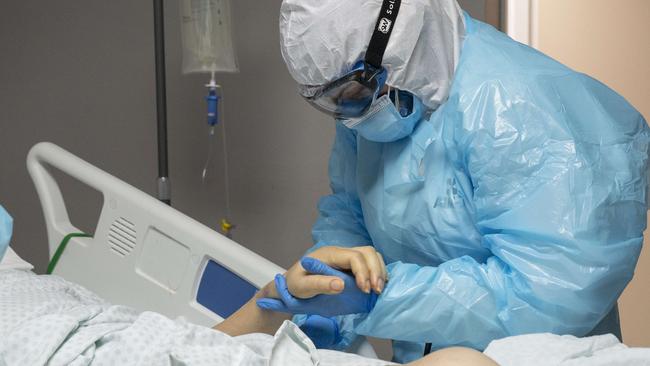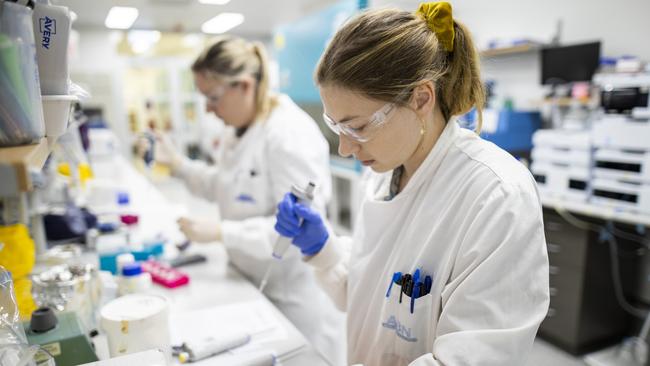Lucy Carne: Rise in ‘long COVID’ sufferers should be reason for all Australians to vaccinate
The shocking rise in ‘long COVID’ sufferers overseas and Australia should motivate everyone to get the vaccination.
QLD News
Don't miss out on the headlines from QLD News. Followed categories will be added to My News.
Chatting to an Uber driver last week about reopened borders, I said how worried I was that our false sense of security has made so many people ambivalent about getting vaccinated.
“I’ve already had it,” he said.
He got COVID-19 in March and is certain it was from international passengers he picked up from either a cruise ship or the airport.
Lucy Carne: Forget anti-vaxxers, it’s the vaccine hesitant we should be worried about
Lucy Carne: Queensland’s quarantine exemption mess has created an unfair class hierarchy
Lucy Carne: Queensland needs daylight saving to help rebuild pandemic-hit economy
That was back when travellers were taken to quarantine hotels by taxis and you couldn’t get a coronavirus test unless you had been in direct contact with a known positive case.
He lost his sense of taste and smell and started to feel sick. Ten days later he was in a very bad way. His GP demanded Queensland Health allow him to be tested.
He was sent to a pathology clinic in a shopping centre. Walking back to his car, he collapsed and bystanders called an ambulance.
His test came back positive and he spent weeks in the Royal Brisbane Hospital’s COVID-19 unit.
It was “not great”, but he adds, he didn’t die.
Instead, far worse has been the long, dragged out coronavirus hangover. Unlike a normal post-viral experience, the lethargy and aches don’t subside within a few weeks.
Before catching COVID-19 he would cycle 150km a week. Now he can’t even ride down the street.
He has gained 11kg, has no energy and suffers brain fog.

It’s been nine months and he has not improved, although his antibodies are still high.
“I never realised this is what coronavirus did,” he said. It’s known as “long COVID” and affects about one in four people who get the virus, including young people and those who only have a mild case.
Women aged between 50-60 are most at risk of long COVID, according to a recent study.
Persistent pain, lasting cognitive difficulties, long-term inflammation in the lungs, cardiovascular and neurological systems, breathlessness, organ damage and coughs are some of the permanent hallmarks of long COVID.
Fatigue is common in long haulers.
Or devastatingly, your sense of smell may never properly return, as doctors have told The Times journalist Alice Thomson.
“Six months later, I still can’t tell the difference between the smell of an overripe banana or lavender,” she wrote.
“I can distinguish petrol but not gas, dog mess but not roses, bacon but not freshly cut grass. Everything else smells of burnt condensed milk.”
The UK’s NHS has opened 40 long COVID clinics and the WHO is updating its COVID-19 guidance to include long COVID.
In all the debate about coronavirus and the selfish justifications to not vaccinate because most people “won’t die”, what has been missed is the vast number of people who suffer these vicious long-term side effects.
As if the rising death toll in the US and Europe is not enough to unify Australians to vaccinate, the complexity and scale of long COVID should have us all rolling up our sleeves.
Which is why the cancellation of UQ and CSL’s vaccine trial last week is so gut-wrenching.
Not just because the incredible scientists on that team, who sacrificed countless nights and weekends diligently trying to find a way to protect us, must abandon their hard work.
What’s enraging is that it’s been cancelled not because the potential vaccine wouldn’t work (in fact, it showed promising signs of being one of the world’s most effective vaccines in development), but simply to appease the anti-vaxxers who have polluted the community with fear and lies.
The test did not, as is being falsely circulated in anti-vax groups, give vaccine participants HIV.

What it did was reveal just how good our HIV screening is, that it can detect minor fragments of inactive HIV used in the vaccine clamp.
And so, this is where we have arrived courtesy of the Dunning-Kruger effect.
A once proud nation of incredible scientific talent that boasts a history of medical breakthroughs, including penicillin, the bionic ear, ultrasounds, spray-on skin and the cervical cancer vaccine has now been reduced to an international embarrassment.
Why? Because a bunch of Aussie Karens on Facebook still think the MMR jab gives kids autism.
Six people died from the Pfizer coronavirus vaccine trial, they scream across the gutters of social media, failing to add that four of those received the placebo in a trial of 44,000 people.
But this should never have become a battle between anti-vaxxers and fact.
It is a fight between humanity and a virus.
We are not untouchable. Coronavirus exists. And while we may not all die, the risk of long COVID is very real.
I don’t know about you, but I want to hold on to my sense of smell. Bring on the vaccine.



